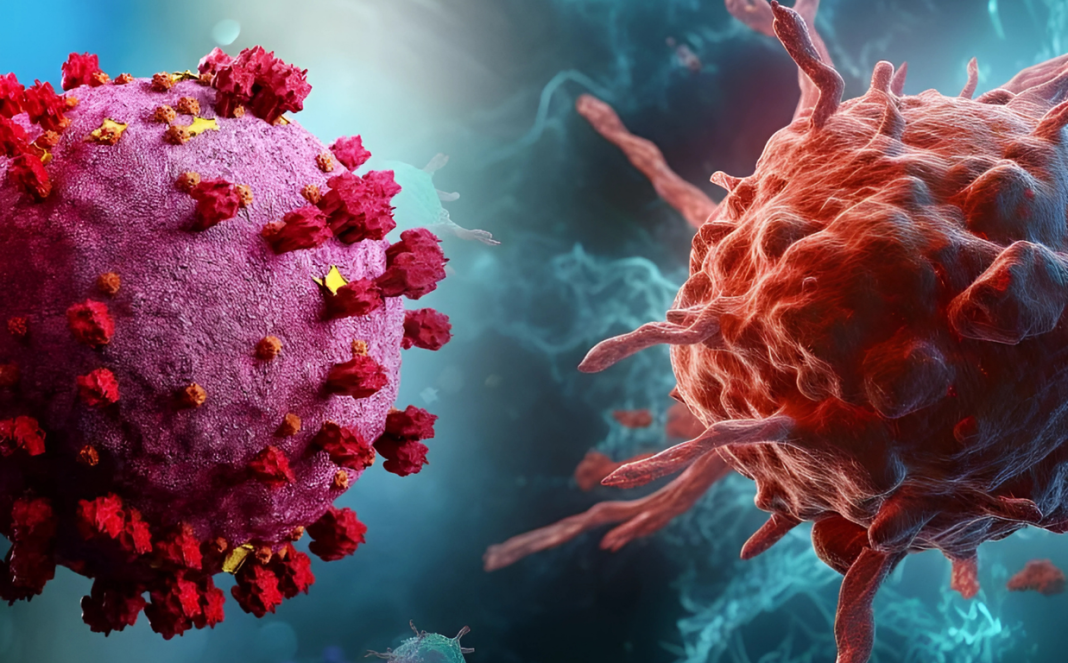Contents
- 1 Using Viruses to Combat Deadly Diseases: A Medical Breakthrough?
- 2 The Bold Scientific Claim: Can COVID-19 Destroy Cancer Cells?
- 3 The Science Behind It: How Can a Virus Fight Cancer?
- 4 The Role of Immune Cells: Strengthening the Body’s Natural Defenses
- 5 Is This Research Reliable? Expert Opinions on the Findings
- 6 Immunotherapy and the Future of Cancer Treatment
- 7 Challenges in Implementing This Research Globally
- 8 A Promising Yet Uncertain Future
Using Viruses to Combat Deadly Diseases: A Medical Breakthrough?
Scientists have long searched for innovative ways to treat cancer, and recent research suggests an unexpected candidate—the coronavirus. While COVID-19 caused global devastation, scientists are now exploring its potential to fight cancer by leveraging its unique effects on the immune system. Could the coronavirus be the key to controlling and potentially curing cancer?
The Bold Scientific Claim: Can COVID-19 Destroy Cancer Cells?
A groundbreaking study published in Clinical Investigation by Northwestern University researchers suggests that deadly viruses, including the coronavirus, might help eliminate life-threatening diseases like cancer. Early experimental studies conducted on animals indicate that the SARS-CoV-2 virus may play a role in destroying cancer cells.
The Science Behind It: How Can a Virus Fight Cancer?
There’s a well-known saying: “Fight fire with fire.” Scientists at Northwestern University, led by researcher Ankit Bharat, are applying this principle by investigating the effects of the coronavirus on cancer cells. Their research suggests that the RNA of the SARS-CoV-2 virus can stimulate the body’s immune response, leading to an increase in immune activity against cancer cells.
RNA, a crucial component in cellular processes, plays a key role in gene regulation. When the coronavirus infects the body, the immune system becomes highly activated. This heightened immune response might prevent the spread of cancer cells. But how does this happen?
The Role of Immune Cells: Strengthening the Body’s Natural Defenses
When the body detects an infection, white blood cells, specifically immune cells known as monocytes, spring into action. Monocytes usually circulate in the bloodstream and help fight off pathogens. However, their ability to target cancer cells is limited. The body lacks the necessary receptors to direct these cells toward tumors.
However, scientists have discovered that when the coronavirus enters the body, it induces monocyte changes. These monocytes transform into a specialized type called nonclassical monocytes. More importantly, these new immune cells develop a receptor known as CCR2, which enables them to locate and attack cancer cells.
Is This Research Reliable? Expert Opinions on the Findings
While this discovery is exciting, medical experts urge caution. Prominent oncologist Dr. Gautam Mukherjee notes that while the immune response triggered by COVID-19 may have unexpected benefits, further research is needed. Many cancer patients saw worsened conditions when infected with COVID-19, delaying their treatment and causing severe complications.
According to Dr. Mukherjee, a single study cannot validate these findings. Long-term research is necessary to determine whether COVID-19 can aid cancer treatment. If further studies confirm this, it could be a breakthrough in cancer therapy, potentially saving countless lives.
Immunotherapy and the Future of Cancer Treatment
Dr. Shubhdeep Chakraborty, another cancer specialist, highlights that this approach falls under the broader field of immunotherapy. This technique enhances the body’s natural defense mechanisms to fight cancer. However, he emphasizes that the research is still in its infancy and has only been tested on animals. Human trials are essential to assess its actual effectiveness.
Dr. Chakraborty also warns that individual responses to the coronavirus vary greatly. While one person’s immune system might effectively combat cancer with COVID-19’s help, another could experience severe complications. This variation makes it difficult to draw definitive conclusions at this stage.
Challenges in Implementing This Research Globally
Even if these studies prove successful in the United States, implementing such treatments worldwide poses significant challenges. Climate, genetics, immune responses, and environmental factors differ across populations, so what works in one country may not yield the same results elsewhere.
Additionally, ethical concerns and safety issues must be carefully evaluated before introducing virus-based cancer therapies. Researchers must conduct extensive trials and closely monitor side effects to ensure patient safety.
A Promising Yet Uncertain Future
The idea of using the coronavirus to cure cancer is both intriguing and controversial. While preliminary research suggests potential benefits, much remains unknown. Scientists must conduct further studies to confirm these findings, test the approach in diverse populations, and ensure it is safe for widespread use.
If successful, this discovery could revolutionize cancer treatment, providing new hope for millions. However, the world must wait for more conclusive evidence before considering the coronavirus as a viable tool in the fight against cancer.



